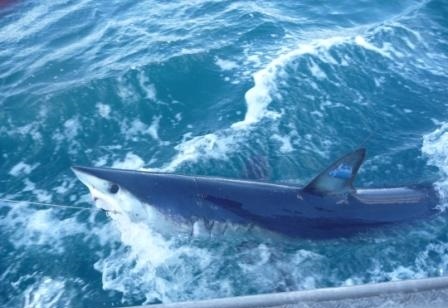 Who knew that shortfin mako sharks and South Florida’s seasonal residents shared something in common?
Who knew that shortfin mako sharks and South Florida’s seasonal residents shared something in common?
“Rob,” a five and one-half-foot long male shortfin mako shark, is officially a snowbird. Tagged off the coast of Ocean City, Md. in June of 2017, Rob is currently pinging off the coast of North Carolina after spending the winter and spring swimming along the eastern coast of Florida and Georgia.
“We’ve been tracking mako sharks for some time now, and we continue to see new aspects about their migratory behavior,” said Mahmood Shivji, Ph.D., the director of NSU’s Guy Harvey Research Institute and a professor in the university’s Halmos College of Natural Sciences and Oceanography. “Our research has recently revealed that makos are overfished in the western Atlantic Ocean; a good understanding of their migratory patterns is essential to improve conservation and management of this shark so its population size can recover.”
Rob is one of more than 150 sharks of different species tagged by scientists from Nova Southeastern University’s (NSU) Guy Harvey Research Institute (GHRI) in the last decade. According to data received from Rob’s tracker, he has travelled 6,675 miles in 328 days and shows no sign of slowing down.
The data collected from these tagged fish is used to study migration patterns. Many of them can be followed online in near real-time at nova.edu/sharktracking. Understanding where these animals live and travel is essential to proper management.
NSU’s GHRI tracking data recently confirmed that the fishing mortality rate for mako sharks in the NW Atlantic Ocean is 10 times what was previously thought. Because of this and other data, the National Marine Fisheries Service recently instituted increased protections for shortfin mako sharks, an economically and ecologically important species.
Rob is the mako’s nickname, which is tracked on the map by his sponsor’s name Advanced Roofing 3.
###
About NSU’s Halmos College of Natural Sciences and Oceanography: The college provides high-quality undergraduate (bachelor’s degree) and graduate (master’s and doctoral degrees and certificates) education programs in a broad range of disciplines, including marine sciences, mathematics, biophysics, and chemistry. Researchers carry out innovative basic and applied research programs in coral reef biology, ecology, and geology; fish biology, ecology, and conservation; shark and billfish ecology; fisheries science; deep-sea organismal biology and ecology; invertebrate and vertebrate genomics, genetics, molecular ecology, and evolution; microbiology; biodiversity; observation and modeling of large-scale ocean circulation, coastal dynamics, and ocean atmosphere coupling; benthic habitat mapping; biodiversity; histology; and calcification. The college’s newest building is the state-of-the-art Guy Harvey Oceanographic Center, an 86,000-square-foot structure filled with laboratories; offices; seminar rooms; an auditorium; and indoor and outdoor running sea water facilities. Please visit cnso.nova.edu for more information.
About Nova Southeastern University (NSU): Located in beautiful Fort Lauderdale, Florida, NSU is ranked among U.S. News & World Report’s Top 200 National Research Universities and is a dynamic, private research university providing high-quality educational and research programs at the undergraduate, graduate, and first-professional degree levels. Established in 1964, NSU now includes 16 colleges, the 215,000-square-foot Center for Collaborative Research, a private JK-12 grade school, the Mailman Segal Center for Human Development with specialists in Autism, the world-class NSU Art Museum Fort Lauderdale, and the Alvin Sherman Library, Research and Information Technology Center, which is Florida’s largest public library. NSU has campuses in Fort Lauderdale, Fort Myers, Jacksonville, Miami, Miramar, Orlando, Palm Beach, and Tampa, Florida, as well as San Juan, Puerto Rico, while maintaining a presence online globally. Classified as a research university with “high research activity” by the Carnegie Foundation for the Advancement of Teaching, NSU is one of only 50 universities nationwide to also be awarded Carnegie’s Community Engagement Classification, and is also the largest private institution in the United States that meets the U.S. Department of Education’s criteria as a Hispanic-serving Institution. Please visit www.nova.edu for more information about NSU.
About the Guy Harvey Ocean Foundation: The Guy Harvey Ocean Foundation (GHOF) conducts scientific research and hosts educational programs aimed at conserving the marine environment. The GHOF also funds affiliated researchers working to better understand our ocean ecosystem and educators helping to foster the next era of marine conservationists. The GHOF will help ensure that future generations can enjoy and benefit from a properly balanced ocean ecosystem. For more information, please visit www.GHOF.org
About NSU’s Guy Harvey Research Institute: Established in 1999, the Guy Harvey Research Institute (GHRI) is a collaboration between the renowned marine artist, scientist and explorer, Dr. Guy Harvey, and Nova Southeastern University. The mission of NSU’s GHRI is to provide the scientific information necessary to understand, conserve, and effectively manage the world’s marine fishes and their ecosystems. The institute is one of only a handful of private organizations dedicated exclusively to the science-based conservation of marine fish populations and biodiversity. The research, education and outreach activities of NSU’s GHRI are supported by the Guy Harvey Ocean Foundation, AFTCO Inc., extramural research grants, philanthropic donations by private businesses and individuals, and NSU. Please visit http://cnso.nova.edu/ghri for more information.
